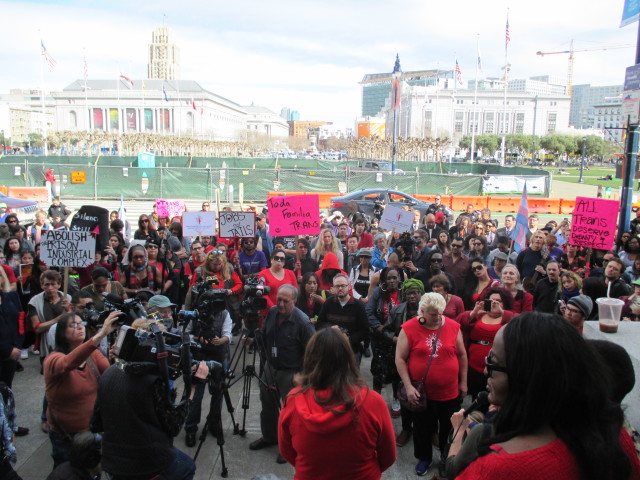Trans women of color are dying in the streets. The time for talk is long past

By Tom Temprano
FEBRUARY 13, 2015 — In 2015 San Francisco is being faced with a serious question: will we sit idly by as the T is removed from our city’s LGBT community?
The tragic murder of Taja DeJesus on February 1st has brought the harassment, discrimination and violence that trans people, particularly trans women of color, face on a daily if not hourly basis to the fore of San Francisco’s consciousness. And it’s about time.
 For far too long our city’s LGB population has grown its political and financial power without doing the necessary work of ensuring that our trans sisters and brothers were growing theirs as well. We have known that the trans community faces far more poverty, violence and discrimination in housing, education and yet we have not made righting these wrongs the core platform of our movement. We have under-acted and the consequences are dire.
For far too long our city’s LGB population has grown its political and financial power without doing the necessary work of ensuring that our trans sisters and brothers were growing theirs as well. We have known that the trans community faces far more poverty, violence and discrimination in housing, education and yet we have not made righting these wrongs the core platform of our movement. We have under-acted and the consequences are dire.
Taja was taken from us at the age of 36. A trans woman was stabbed in the chest only weeks earlier after being targeted on a Muni bus. Anastasia, a homeless trans woman, died on the street in the Castro on New Years Eve as people passed by her body for hours without stopping to see if she was OK. One out of every two transgender students in our city’s public schools has attempted suicide. And the list goes on and on.
This has to stop.
Where do we start to undo decades of neglect for the needs of trans San Franciscans? The organizers of TAJA’s Coaltition, who organized a massive die-in and protest at City Hall this past Tuesday have made the following demands:
1. We demand that cisgender people end violence against trans* communities, and particularly transgender women of color. Transphobia and violence against trans* people is not a trans* problem. It is a problem rooted in and created by cisgender people, and there is a call to see active support of and participation in local and national efforts to create resources, access and justice for our trans* communities.
Trans* communities need safety and access to resources, not jails. We demand that all plans for a new jail in San Francisco be ceased, and that no new jail construction is included in any City planning or budget with funds being routed instead to trans* community programming, especially re-entry support and anti-violence work, with respect for the depth of work not the quantity.
We demand safe, affordable, and accessible housing for trans people. The rising cost of living in San Francisco, fueled by municipal protections for corporate interests at the expense of our most vulnerable residents, has forced countless trans* people into unsafe living situations. Additionally, the massive gentrification of the Mission, Tenderloin, and SOMA neighborhoods in the past two years has displaced countless residents. San Francisco must shift its priorities away from protecting corporations and toward providing affordable housing for all who need it and particularly creating affordable housing services, safe housing programs and more safe spaces for trans* people.
After Tuesday’s protest, and hours of public comment by trans women of color at the Board of Supervisors, Supervisor David Campos called for a hearing to address the results of a recent report on violence against members of the LGBTQ community. This hearing is a step in the right direction, but the board has neglected the needs of transgender San Franciscans for far too long. When I spoke to Campos’ legislative aide Nate Allbee about how the Board of Supervisors can be better on trans issues he said that “Most people seem happy to discuss their support of the trans community but often when it comes to budget season we’re alone in fighting for funding for organizations that protect and support trans people.”
2015 is the year that San Francisco needs to stop discussing and start acting. Trans women of color are dying in our streets – talk isn’t working. The TAJA Coalition’s 1st stated demand is simple –- as cis-gender allies we need to get off our apathetic asses and stand up for more resources, leadership opportunities and justice for our local trans community. Lives depend on our action so let’s get moving.
Trans-exception from greater LGB consciousness is not just a San Francisco Problem. I spent much of last week at the Creating Change Conference in Denver, which brings together LGBTQ activists from around the country, and the conference’s most powerful moments came when trans women of color quite literally stole the stage.
The conference’s opening night plenary, which was set to be headlined by the mayor of Denver, was instead headlined by a group of protestors, lead by trans women of color who stormed through the aisles of the Sheraton Hotel’s grand ballroom wielding protest signs and issued their demands that the assembled crowd stand up for trans lives. Frankly, their action was far more powerful and instructive than any planned moment at the conference. It was so effective, as was the simultaneous protest in honor of Jessie Hernandez, a gender non-conforming 17 year old queer
Latina who was shot to death miles from the conference only a week before that the mayor declined to speak. Which was good. It wasn’t his platform to have – it was theirs.
Why are transgender women of color in San Francisco and around the United States protesting so loudly? Because they are being murdered. Five trans women of color, including Taja, have been killed in this country in 2015 alone. That is one per week.
There is an epidemic of structural violence against trans women of color in this country much in the way that there is an epidemic of state violence against Black men in this country. As an LGBT movement, a movement that should be wholly concerned with achieving justice for all of us – not just concerned with how well corporations score on a corporate equality index, I am deeply disappointed that we haven’t done more. In moments like we are faced with today we should be actively inviting racial justice and trans justice voices to be a central in the LGBT movement. They shouldn’t have to protest just to be heard.






